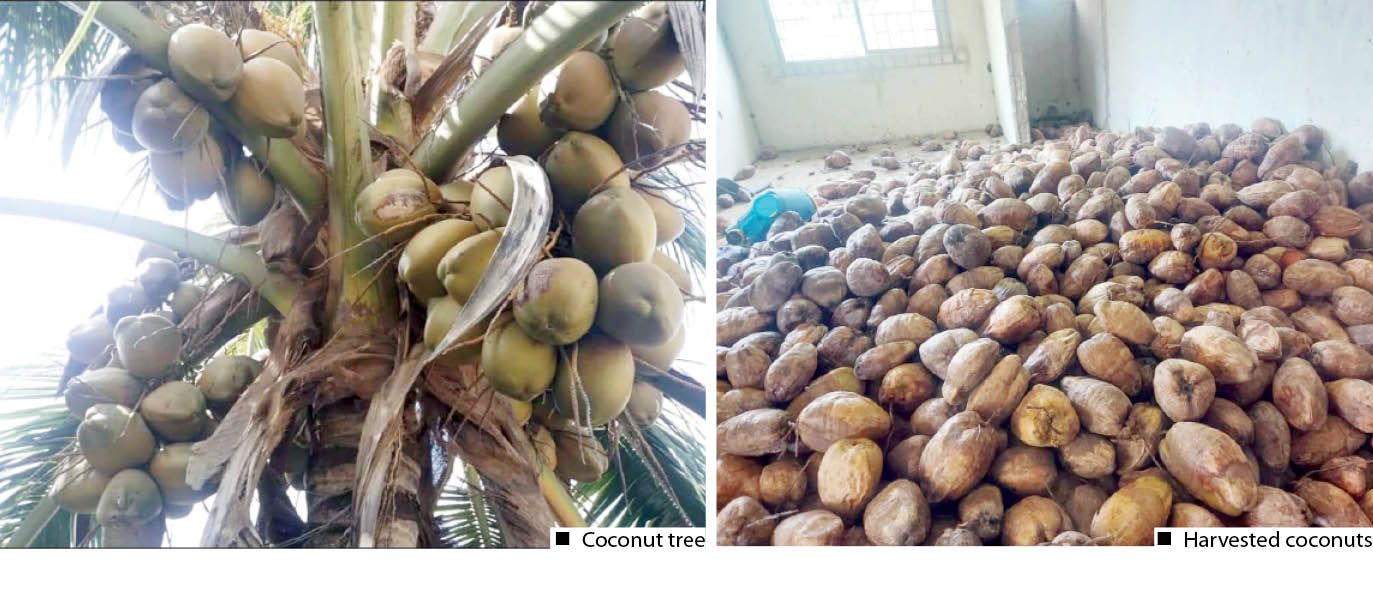Globally, the market for coconut is more than $6 billion, and Nigeria taps nothing from this market, and instead spends over N128 million on imports from Ghana and Ivory Coast.
The Minister of State for Industry, Trade and Investment, Mariam Katagum, at a recent stakeholders meeting in Abuja, said despite huge potentials in the country “the local supply can only meet about 20 per cent of the demand, hence the need to urgently address the supply side constraints.
- NIGERIA DAILY: The story behind Ikoyi building collapse
- Bama-Banki-Cameroon road reopened after nine years
“Without doubt, we need more coconut plantations and industries to support the few that already exist in states like Akwa Ibom, Lagos and Rivers. The Nigerian coconut industry can be given a boost with more investment so that it can provide jobs to thousands of youths through its numerous value chains.”
Mrs Katagum stressed that the country worked harder to increase “our market share, and the best strategy is to start cultivation of the commodity for improved yield.
“Last year the global coconut milk market size was $ 184.9m, and it is expected to reach $ 497.9m by the end of 2027, with a CAGR of 17.0 per cent during 2021-2027.”
As of 2019, the figure of coconut that was produced in Nigeria was about 265,000 metric tons, which ranked Nigeria as the 19th coconut producing nation in the world.
Therefore, the 2021 coconut planting season is aimed at achieving the actualisation of Coconut Sufficiency in Nigeria (COSIN) through 10,000 square metres of coconut farms in all the coconut viable states through the “1 Family 3 Coconut Trees” initiative.
In an interview with Daily Trust, Mrs Okoroji Nma Okechukwu, the President of the National Coconut Producers, Processors and Marketers Association of Nigeria (NACOPPMAN), stated that the Coconut Associations in Nigeria (COSIN) was working towards establishing 10,000 hectares of coconut farmland in each of the 30 coconut viable states in Nigeria.
“In order to arrest the situation of importation of coconut, which is one commodity that is surplus in Nigeria and that we have the manpower and good weather conditions to grow, COSIN launched its six-ear strategic programme that will run from 2021 to 2027.
“It was launched by NACOPPMAN in partnership with the Federal Ministry of Trade and Investment and the Federation of Agricultural Commodity Associations of Nigeria (FACAN).
“Coconut is a tree of life; a cash crop that grows in over 30 of Nigeria’s 36 states, with Lagos and Akwa Ibom having the largest production area. An estimated 36,000ha is presently under cultivation, mostly in Lagos, Akwa Ibom and Rivers. An estimated 1.2 million hectares is suitable for coconut cultivation in Nigeria.”
Mrs Okechukwu explained that the Nigerian coconut industry was 80 per cent untapped, stating that the industry had great potential to generate foreign exchange (forex) greater than that of crude oil and boost the Gross Domestic Product (GDP).
She emphasised that the crop could play a significant role in the economic development of the country, adding that the federal government needed to stop importing what could be locally produced.
NACOPPMAN which has handed out coconut seedlings in12 states is currently on the planting part of the project.
Mrs Okechukwu further said, “In Nigeria, our potential revenue for the 36 states plus the FCT, if COSIN is properly implemented, will be N320,000,000 x 37 = N11. 8bn,” adding that, “We have received 5,000 seedlings from the Federal Ministry of Agriculture and Rural Development.”
Also speaking, Mr Dapo Olakulehin, the General Manager of the Lagos Coconut Development Authority, while explaining the current status of coconut production in Lagos, said the state produced 70 per cent of coconut in Nigeria.
“The Lagos State administration under Governor Babajide Sanwolu distributed 140,000 coconut seedlings to farmers in all the coconut producing LGAs of the state in 2020 free of charge. This year alone, the agency has sold close to 500,000 seedlings to farmers across the state at a subsidised price to encourage people going into coconut production.
“We want to encourage people, even if it’s a small place at the backyard of your home or land to plant coconut, this is how we can turn the economy around; it should not be restricted to the coastline alone.”
Speaking on the processing, Mr Olakulehin said the state had 2,000 coconut processors.
On the challenges facing edible coconut, he said, “Our local production cannot meet up with the processing needs; we are only producing 40 per cent of the processing need. The problem is not that the farmers are not producing, but the awareness and benefits of coconut increased by 500 per cent in the last 10 years. So there’s pressure on the processing end and therefore the processors cannot meet up with the need. This is why the remaining 60 per cent is being gotten from Ghana, Cote d’Ivoire, etc.
“Lagos State wants to rehabilitate the coastal line of Seme to Ibeju-Lekki to plant coconut trees, which apart from enriching the economy, will also protect the environment of Lagos State. The state government is looking for private investors that can invest in the processing of the non-edible resources of coconut.
“In terms of utilisation of coconut production, the government is of the opinion that we should come up with the idea of allowing people to use coconut and increase the consumption of coconut among citizens. Bakeries should be supported to produce coconut bread that ordinary people can afford.”
By Grace Adetutuz

 Join Daily Trust WhatsApp Community For Quick Access To News and Happenings Around You.
Join Daily Trust WhatsApp Community For Quick Access To News and Happenings Around You.
